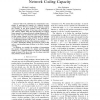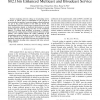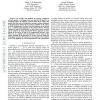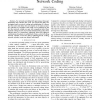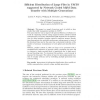111
click to vote
TIT
2011
14 years 9 months ago
2011
Abstract—This work addresses the computational complexity of achieving the capacity of a general network coding instance. We focus on the linear capacity, namely the capacity of ...
119
click to vote
VTC
2010
IEEE
15 years 13 days ago
2010
IEEE
—Applying network coding on broadcasting service is known to reduce times of transmission in the process of recovering the loss packets. In previous design, coding coefficients ...
106
click to vote
JSAC
2008
15 years 2 months ago
2008
Abstract--To implement network coding, users need to coordinate and cooperate with respect to their strategies in terms of duplicating and transmitting side information across spec...
130
click to vote
CCR
2006
15 years 2 months ago
2006
Network coding is a new research area that may have interesting applications in practical networking systems. With network coding, intermediate nodes may send out packets that are...
119
click to vote
CORR
2008
Springer
15 years 2 months ago
2008
Springer
We consider the problem of securing a multicast network against a wiretapper that can intercept the packets on a limited number of arbitrary network links of his choice. We assume ...
112
click to vote
WICON
2008
15 years 3 months ago
2008
We consider a pair of nodes with stochastic traffic flows who wish to communicate in a bi-directional communication scenario using intermediate relays in two-hop fashion. Intermed...
119
click to vote
NETWORKING
2007
15 years 3 months ago
2007
—For networks providing QoS guarantees, this paper determines and evaluates the worst case end-to-end delays for strategies based on network coding and multiplexing. It is shown ...
137
click to vote
ADHOCNETS
2009
Springer
15 years 4 months ago
2009
Springer
This paper is a sequel of previous work, in which we have studied the traffic management problem in UMTS. The main objective was to improve the spectral efficiency of cellular netw...
110
click to vote
ICC
2007
IEEE
15 years 6 months ago
2007
IEEE
Abstract-- Most user cooperation protocols work in a timesharing manner, where each user transmits its own message and relays for the other at different segments of a time slot. We...
111
click to vote
ICDCS
2010
IEEE
15 years 6 months ago
2010
IEEE
This paper proposes LTNC, a new recoding algorithm to build low complexity network codes. At the core of LTNC is a decentralized version of LT codes that allows the use of fast be...
